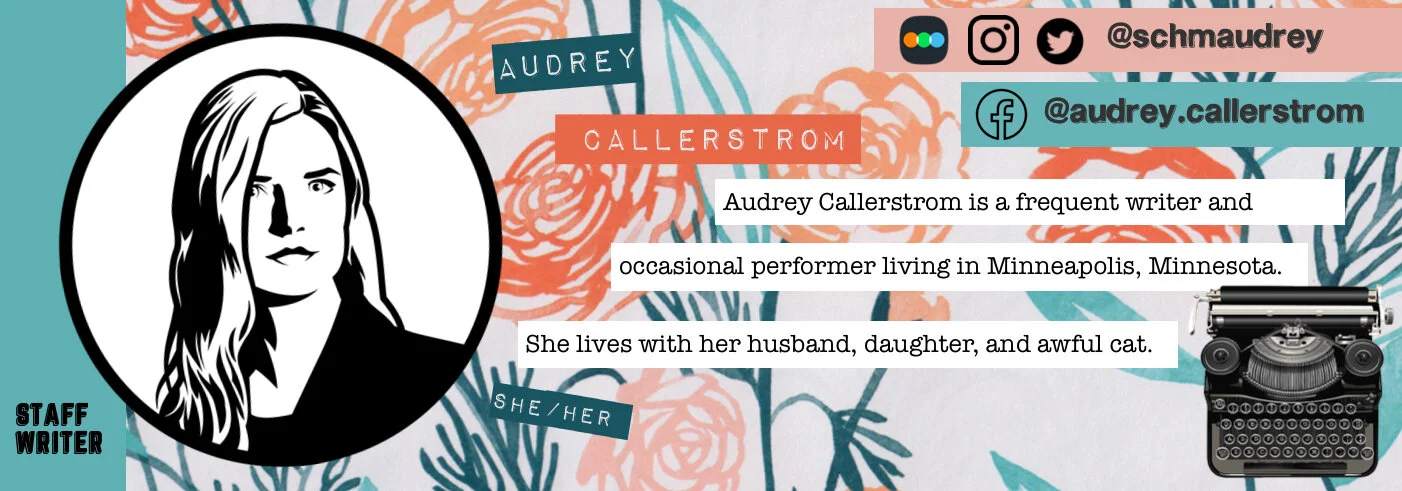WHAT SHE SAID fails to make its characters worth hearing
Directed by Amy Northrup
Written by Jenny Lester
Starring Jenny Lester, Juliana Jurenas, Britt Michael Gordon, Paige Berkovitz, Christopher Mychael Watson
Runtime: 1 hour 39 minutes
by Audrey Callerstrom, Staff Writer
Actress Jenny Lester wrote and stars in What She Said, a so-called “feminist dark comedy.” I don’t think it’s inaccurate to call it feminist, although things like “feminist” and “#metoo” have become buzz words for films just to describe something featuring a strong woman that isn’t overtly misogynistic. But What She Said is not a dark comedy. It’s not dark, and it’s certainly not a comedy. If you’re looking for something biting and edgy, look elsewhere. What She Said is full of interchangeable nothing characters, all of a similar age, who all have some relationship to Sam (Lester), a young woman who was raped and has retreated to her family cabin to isolate. Sam has decided to drop the charges for reasons left unexplained, and her friends and family are concerned and want to try and change her mind.
Do you remember in 2016-2020 when people on social media would describe each year of Trump as a “dumpster fire” and call him names like “Cheeto man” or whatever, and they were so proud of that? Like they truly thought it was funny, and original, every time? That’s these people. Lester doesn’t bother to distinguish characters from each other. They all talk and act alike. Sam and siblings Eli (Britt Michael Gordon) and Becca (Paige Berkovitz) may look a little alike, but they act and talk like three people who may have shared a bus stop at one point. Finding out each character’s relationship always comes as a surprise. A boyfriend character (Christopher Mychael Watson) is suddenly introduced, although he was never brought up in conversation prior between these exhausting, insufferable people. It really feels like all of their experiences, beliefs, and likes/dislikes are identical.
To distinguish them from each other is a task. Although, they look different, so there’s that. They’re all clearly educated, well spoken, and smug. Becca rants about how Thanksgiving is a holiday that celebrates genocide and rape of native people. She says it like it’s supposed to be a shocking revelation, or something that people might counter-argue. But it’s just, like, a known and established fact? And something that was already done much, much better in this monologue. There’s also a scene where Sam’s neighbor Ruthy (Lucas Calzada) and Becca each yell at each other the name of the Harry Potter house they would belong to (that’s about the point I would just decide to drive home). It’s like every character is the same, a representation of the writer and her beliefs, with some surface-level differences built in. Ruthy, for example, is gay. What else is he? Well, like I said, he is gay. Sam also has a couple friends of color. What makes them different from the other characters? Well, I think I already pointed that out to you.
What She Said suffers from a limp script, underwritten characters, and unclear intentions. I don’t think we need to witness the rape that occurred to feel invested in Sam’s story, but we need something that helps us understand who she is aside from what happened to her. And Lester gives us nothing. She gives us nothing in terms of writing and she gives us nothing with her monotone performance. Watching the film is an absolute chore from moment to moment. If Lester had a vision, she desperately needed a co-writer to help her execute it in a more meaningful way. Not only does each character feel like a copy of the other, but it feels like the film starts at the halfway point. Montages where characters hug and mope to folksy indie songs feel unearned. People are always telling us what Sam means to them and what she’s like as a person. But we never, ever see it. We’re just supposed to trust that she’s, like, sort of difficult and self-centered, while she listens to the conversation from the other room with a blank stare. Amy Northrup, who directed the film, also teaches filmmakers classes about consent practices, like using clear, safe language with performers and establishing boundaries. It’s clear she’s a good fit for this material, but she can’t fix it.


